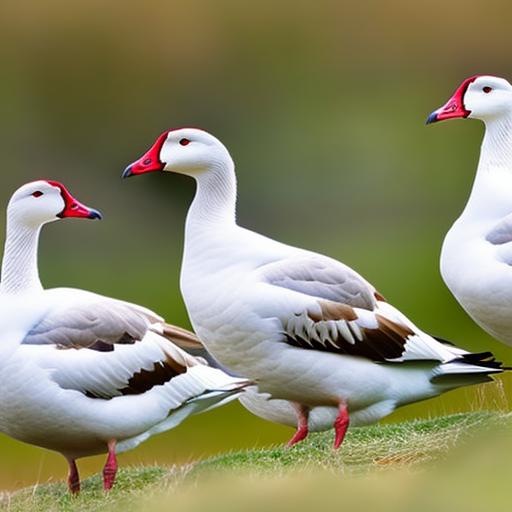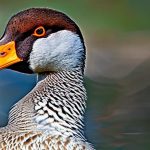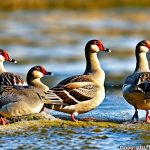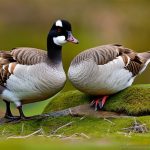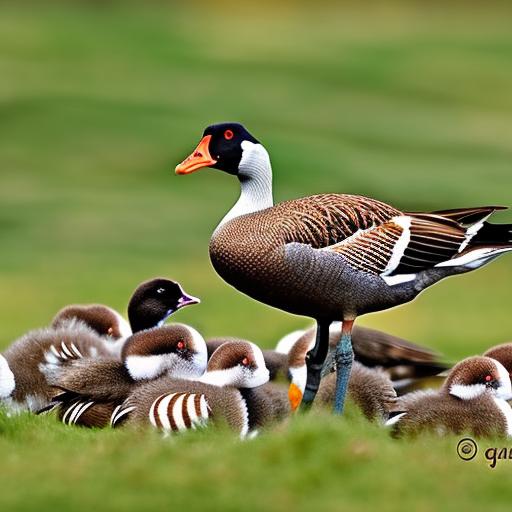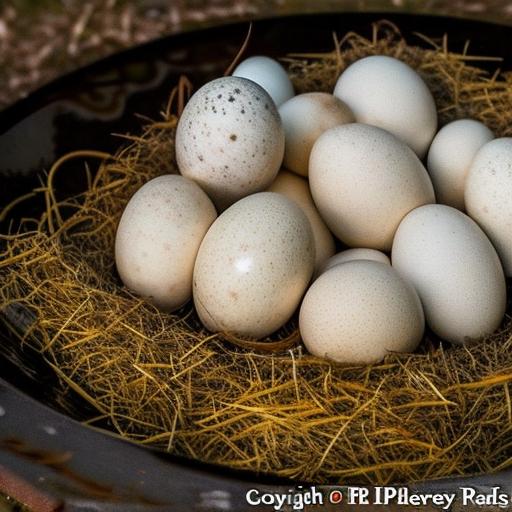The breeding season of Embden geese typically begins in late winter or early spring, around the months of February and March. During this time, the geese become more active and vocal, and the males may become more aggressive as they compete for the attention of the females. It is important to understand the natural breeding behaviors of these geese in order to successfully manage their breeding process. Embden geese are known to be monogamous, meaning they form long-term pair bonds with their mates. This makes it essential to ensure that each goose has a suitable mate for breeding. Additionally, understanding the natural breeding season of Embden geese can help breeders anticipate and prepare for the specific needs and behaviors of the geese during this time.
During the breeding season, female Embden geese will begin to lay eggs, typically laying one egg every one to two days until they have a clutch of around 5-10 eggs. It is important to provide the geese with a suitable nesting area where they can lay and incubate their eggs. Understanding the timing and frequency of egg laying during the breeding season can help breeders monitor the progress of the breeding process and make any necessary adjustments to ensure the health and well-being of the geese and their offspring.
Selecting the Right Breeding Stock
Selecting the right breeding stock is crucial for successful breeding of Embden geese. When choosing breeding stock, it is important to select healthy, mature geese that exhibit desirable traits such as good conformation, strong fertility, and good maternal instincts. It is also important to select geese that are unrelated in order to avoid inbreeding and maintain genetic diversity within the flock. Additionally, breeders should consider the temperament and behavior of the geese when selecting breeding stock, as aggressive or overly timid geese may not be suitable for breeding.
When selecting breeding stock, breeders should also consider the purpose of their breeding program. Whether breeding for meat, eggs, or exhibition, it is important to select geese that meet the specific requirements for the intended purpose. For example, if breeding for meat production, breeders may prioritize selecting geese with good growth rates and meat quality. On the other hand, if breeding for exhibition, breeders may prioritize selecting geese with desirable physical characteristics and conformations. By carefully selecting the right breeding stock, breeders can improve the overall quality and productivity of their flock.
Creating the Ideal Breeding Environment
Creating the ideal breeding environment is essential for successful breeding of Embden geese. The breeding environment should provide the geese with adequate space, protection from predators, and access to clean water and nutritious feed. It is important to provide nesting areas where the geese can lay and incubate their eggs in a safe and comfortable environment. Nesting areas should be secluded and protected from disturbances in order to minimize stress and maximize the chances of successful incubation.
In addition to providing suitable nesting areas, breeders should also ensure that the breeding environment is free from potential hazards such as sharp objects, toxic plants, or other substances that could harm the geese or their offspring. The breeding environment should also be well-ventilated and free from excessive moisture in order to prevent respiratory issues and other health problems. By creating an ideal breeding environment, breeders can help ensure the health and well-being of their geese and maximize the chances of successful breeding.
Managing the Breeding Process
Managing the breeding process of Embden geese requires careful observation and attention to detail. Breeders should monitor the behavior and health of their geese closely during the breeding season in order to identify any potential issues or complications that may arise. It is important to provide regular health checks and veterinary care to ensure that the geese are in optimal condition for breeding. Additionally, breeders should monitor the progress of egg laying and incubation in order to identify any problems that may arise and take appropriate action to address them.
During the breeding process, it is important to provide the geese with a balanced diet that meets their nutritional needs for optimal reproductive performance. This may include providing supplemental feed or adjusting feeding practices based on the specific needs of the geese during the breeding season. Breeders should also provide access to clean water at all times in order to ensure proper hydration for the geese and their offspring. By managing the breeding process effectively, breeders can help ensure the success of their breeding program and the health of their flock.
Maximizing Fertility and Hatchability
Maximizing fertility and hatchability is essential for successful breeding of Embden geese. In order to maximize fertility, breeders should ensure that their breeding stock is healthy, well-nourished, and free from any potential reproductive issues. Providing a balanced diet, suitable nesting areas, and a stress-free environment can help maximize fertility in geese during the breeding season. Additionally, breeders should monitor the behavior and interactions of their geese in order to identify any potential issues that may affect fertility.
In order to maximize hatchability, breeders should ensure that eggs are collected promptly after being laid and stored in a suitable environment until they are ready for incubation. It is important to handle eggs carefully in order to prevent damage or contamination that could affect hatchability. Additionally, breeders should provide suitable incubation conditions such as temperature and humidity control in order to maximize the chances of successful hatching. By maximizing fertility and hatchability, breeders can increase the overall productivity and success of their breeding program.
Caring for Embden Goose Goslings
Caring for Embden goose goslings requires careful attention and specialized care in order to ensure their health and well-being. Goslings should be provided with a warm, dry environment in order to maintain their body temperature and prevent chilling. It is important to provide access to clean water and nutritious feed in order to support their growth and development. Additionally, goslings should be protected from potential predators and hazards in order to ensure their safety.
In addition to providing basic care, breeders should also monitor the health and behavior of goslings closely in order to identify any potential issues or complications that may arise. It is important to provide regular health checks and veterinary care in order to address any health problems that may occur. By providing proper care for goslings, breeders can help ensure their survival and growth into healthy adult geese.
Troubleshooting Common Breeding Season Challenges
During the breeding season, breeders may encounter a variety of challenges that can affect the success of their breeding program. Common challenges may include infertility, poor hatchability, egg-related issues, or health problems in adult geese or goslings. In order to troubleshoot these challenges, breeders should carefully monitor the behavior and health of their geese in order to identify any potential issues that may arise.
When troubleshooting common breeding season challenges, it is important for breeders to seek advice from experienced professionals or veterinarians who can provide guidance on how to address specific issues. This may include making adjustments to feeding practices, environmental conditions, or management practices in order to address specific challenges that may arise during the breeding season. By troubleshooting common challenges effectively, breeders can overcome obstacles and improve the overall success of their breeding program.
In conclusion, understanding the breeding season of Embden geese is essential for successful breeding. By selecting the right breeding stock, creating an ideal breeding environment, managing the breeding process effectively, maximizing fertility and hatchability, caring for goslings, and troubleshooting common challenges, breeders can improve the overall productivity and success of their breeding program. With careful attention to detail and specialized care, breeders can ensure the health and well-being of their geese and maximize their potential for successful reproduction during the breeding season.
Meet Walter, the feathered-friend fanatic of Florida! Nestled in the sunshine state, Walter struts through life with his feathered companions, clucking his way to happiness. With a coop that’s fancier than a five-star hotel, he’s the Don Juan of the chicken world. When he’s not teaching his hens to do the cha-cha, you’ll find him in a heated debate with his prized rooster, Sir Clucks-a-Lot. Walter’s poultry passion is no yolk; he’s the sunny-side-up guy you never knew you needed in your flock of friends!

